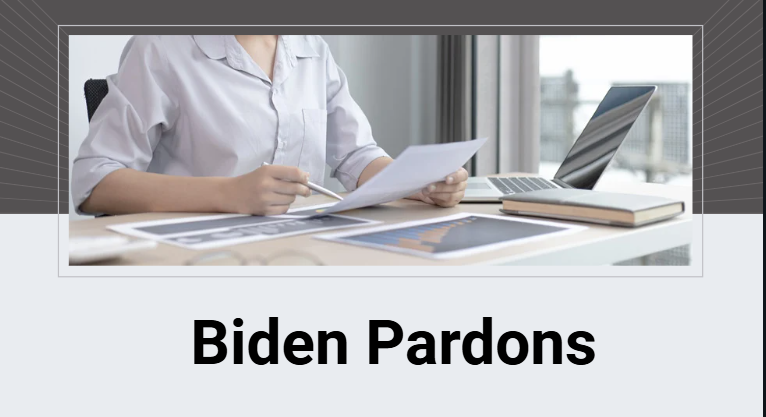President Joe Biden has the power to grant pardons to people who have been convicted of federal crimes. Pardons are a way for the president to forgive someone for their crime or reduce their punishment. Biden has used this power to help certain people, and his choices have drawn attention and discussion. In this article, we explain what Biden pardons are, why they matter, and who has received them.
What is a Presidential Pardon?
A presidential pardon is a legal forgiveness for a federal crime. It is an official act by the president that removes penalties or consequences from a conviction. People who receive a pardon may no longer face legal punishment, and it can also restore rights, like the ability to vote or own a firearm in some cases.
There are two main types of presidential forgiveness:
- Full Pardon – Completely removes legal penalties and forgives the crime.
- Commutation – Reduces a sentence but does not erase the conviction.
How Does Biden Decide Who Gets a Pardon?
The process of giving a pardon is not automatic. People usually apply to the Office of the Pardon Attorney in the Department of Justice. This office reviews cases and recommends candidates to the president. However, the president can also grant pardons without a formal recommendation.
Biden has said that he wants to focus on fairness and justice when choosing who to pardon. This includes helping people who:
- Committed minor nonviolent offenses
- Have shown they are reformed
- Have been unfairly treated in the justice system
Examples of Biden Pardons
Since taking office, Biden has used his pardon power to help different groups of people. Some examples include:
- Nonviolent Drug Offenders: Biden has pardoned people convicted of simple drug possession, aiming to reduce the long-term impact on their lives.
- Military Draft Dodgers: He granted clemency to some people who avoided the draft during the Vietnam War.
- Other Special Cases: Certain individuals who faced unusual hardships or unfair legal situations have received pardons.
These pardons show that Biden wants to correct what he sees as past mistakes in the justice system.
Why Biden Pardons Are Important
Pardons are more than just legal tools—they also send a message about fairness and second chances. Many people who have been convicted of crimes struggle to find jobs, housing, or education opportunities after serving time. A pardon can remove these barriers and allow someone to fully participate in society again.
Biden’s pardons also highlight issues in the justice system, such as:
- Harsh sentences for minor crimes
- Disproportionate punishment for certain groups
- The long-term impact of a criminal record
By using pardons thoughtfully, the president can make the justice system more fair and compassionate.
How the Public Views Biden Pardons
Public opinion about pardons can be mixed. Some people believe pardons are necessary to correct unfair laws or help people get a fresh start. Others worry that pardons might be used too freely or unfairly.
Biden has focused on pardons that seem fair and justified to the public. By focusing on nonviolent and minor crimes, he has tried to avoid controversy while still using his constitutional power.
Limitations of a Presidential Pardon
While pardons are powerful, they have limits:
- They only apply to federal crimes, not state crimes.
- They cannot erase the fact that someone was convicted—they just remove legal penalties.
- They do not protect someone from civil lawsuits.
Understanding these limits is important when discussing the impact of pardons.
The Future of Biden Pardons
Biden may continue to grant pardons as he seeks to address fairness in the justice system. Experts expect that he will focus on nonviolent offenders, people affected by harsh sentencing laws, and cases with special circumstances. Pardons will remain a key tool for promoting justice and second chances in the United States.
FAQs
Q1: What is the difference between a pardon and a commutation?
A pardon completely forgives a crime and removes penalties. A commutation only reduces the sentence but does not erase the conviction.
Q2: Can Biden pardon someone for a state crime?
No. The president can only pardon federal crimes. State crimes must be pardoned by the governor or state authority.
Q3: Do pardons erase a criminal record?
Not entirely. Pardons remove legal penalties, but the record of conviction may still exist.
Q4: Who is eligible for a Biden pardon?
People convicted of federal crimes, especially nonviolent offenders, those showing reform, or individuals unfairly treated in the justice system.
Q5: How does a person apply for a presidential pardon?
They usually submit an application to the Office of the Pardon Attorney in the Department of Justice, which reviews and recommends cases to the president.
Q6: Why are pardons controversial?
Some people worry pardons may favor certain individuals unfairly or weaken the justice system. However, supporters say pardons correct past mistakes and give second chances.
Biden pardons are an important part of his presidency and reflect his approach to fairness and justice. By helping people who have made mistakes or faced harsh sentences, he is using his power to give second chances and make the justice system more compassionate.

